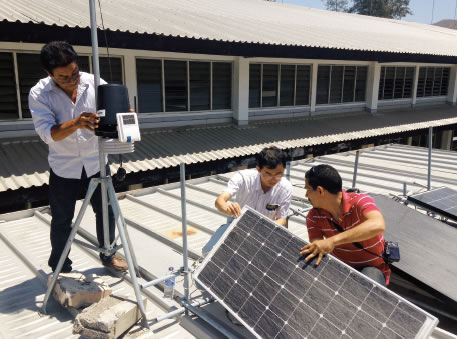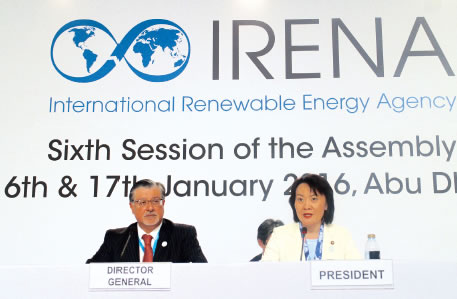(4) Securing Access to Resources and Energy
The number of people without access to electricity in the world is estimated at around 1.3 billion (equivalent to 18% of the world’s population). In particular, this number is estimated to reach 60% of the population (approximately 630 million people) in Sub-Saharan Africa. Meanwhile, in Sub-Saharan Africa, over 70% of the population rely on fuelwood (e.g., charcoal, firewood) for energy for cooking. (Note 36) The indoor air pollution resulting from this is one of the causes of death among young people. (Note 37) The lack of electricity, gas and other energy services leads to the delay in industrial development, a loss of employment opportunities, a further increase in poverty, and restricted access to medical services and education. Going forward, global energy demand is expected to increase further, mainly in emerging and developing countries, particularly in Asia. Thus, a stable energy supply and appropriate consideration to the environment are essential.
<Japan’s Efforts>
In order to realize sustainable development and secure energy in developing countries, Japan works on the provision of services, which enables modern energy supply, and the stable supply of power for industrial development. In addition, Japan provides support for the establishment of an environment-friendly infrastructure, such as construction of energy-saving equipment and power generation facilities that utilize renewable energy (hydropower, solar power, wind power, geothermal power, etc.).
At the G7 Ise-Shima Summit in May 2016 under the presidency of Japan, the leaders made commitments in the Ise-Shima Leaders’ Declaration to support innovation in energy technologies make further investments to encourage clean energy and energy efficiency, and play a leading role in facilitating energy investments. Furthermore, the Tokyo Declaration on the Energy Charter was issued at the 27th Meeting of the Energy Charter Conference held in Tokyo with Japan as the chair country in November the same year. It confirmed the importance of promoting appropriate and continued investment in the energy sector and promoting quality infrastructure investment.

An expert, Dr. Nobukazu Kameyama (center) explains about the facility and equipment at a solar power generation facility to teachers of the Faculty of Engineering, Science and Technology at the National University of Timor- Leste on the outskirts of Dili.(Photo: Atsushi Takahashi)

Then Parliamentary Vice-Minister for Foreign Affairs Miki Yamada chairs the Sixth Session of the Assembly of the International Renewable Energy Agency (IRENA) held in Abu Dhabi, the United Arab Emirates in January 2016.
Meanwhile, Japan provides resource-rich countries with support according to their needs, such as establishing infrastructure around mines, aiming to enable them to acquire foreign currency through the development of their resources and to develop in a self-sustained way. Through these supports, Japan will enhance mutually beneficial relationships with developing countries with rich resources, while striving to ensure the stable supply of energy and mineral resources, by promoting the development of resources, production, and transportation by private companies. It is important to proactively use Japan’s ODA in the resource and energy sectors alongside support from the Japan Bank for International Cooperation (JBIC), Nippon Export and Investment Insurance (NEXI) and Japan Oil, Gas and Metals National Corporation (JOGMEC). Additionally, as an international effort, the G7 initiative on Strengthening Assistance for Complex Contract Negotiations (CONNEX) launched in 2014, aims at improving the capacity to negotiate contracts on natural resources in developing countries and also to contribute to the achievement of the SDGs. In the G7 Ise-Shima Summit in May 2016, under the presidency of Japan, the G7 formulated the CONNEX Guiding Principles towards Sustainable Development as a guideline for G7 members to provide support to resource-rich countries. Based on these efforts, in September an international conference was held in Tokyo, and discussions were held on the potential of CONNEX efforts going forward, mainly on capacity building and improving transparency.
Japan also proactively supports the Extractive Industries Transparency Initiative (EITI). EITI is a multinational cooperative framework to increase the transparency of the flow of money in development of oil, gas, mineral and other resources. Under this framework, extracting corporations report the amount of payment to the governments of resource-producing countries and the governments report the amount of revenue to ensure transparency of the flow of money. Participants in EITI include 51 resource-producing countries, many supporting countries including Japan, extractive companies and NGOs. EITI participants are working together to prevent corruption and conflict, as well as to encourage responsible resource development that leads to growth and poverty reduction.
- Note 36: Source: “World Energy Outlook Special Report 2016”
- Note 37: Sources: IEA, “World Energy Outlook 2015” (estimates as of 2012) IEA, “Africa Energy Outlook 2015”
